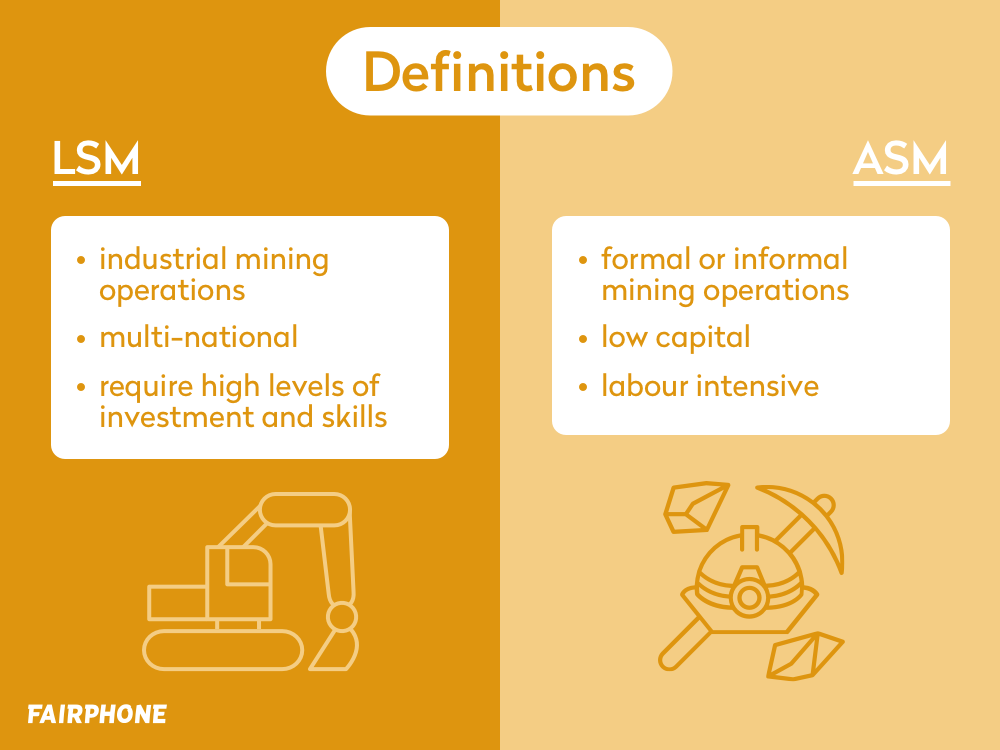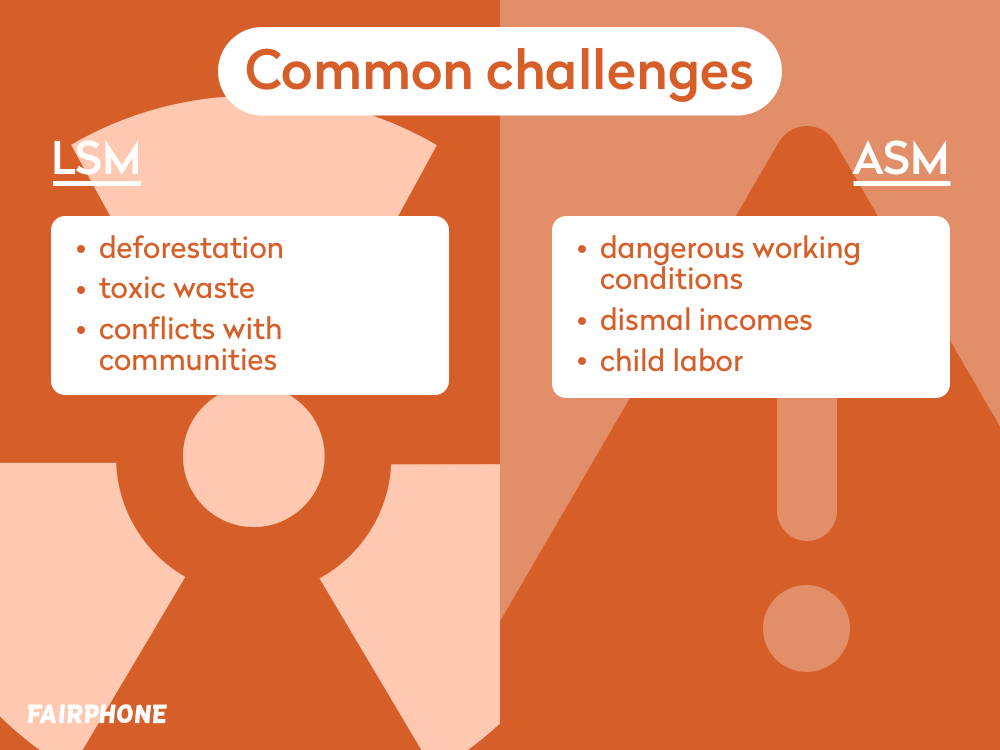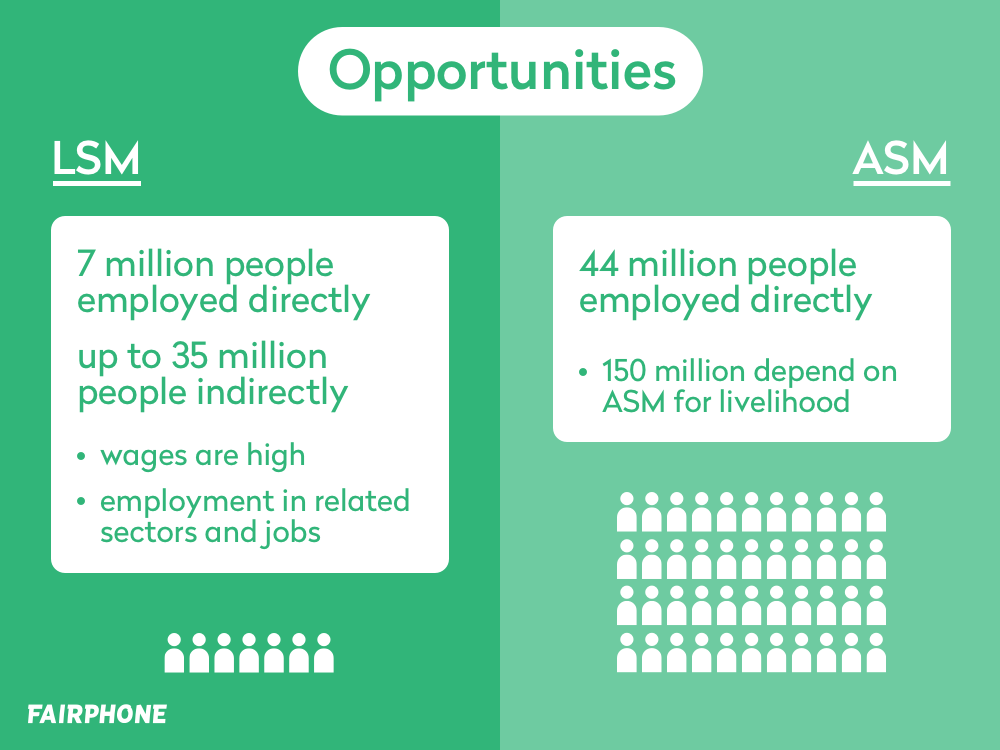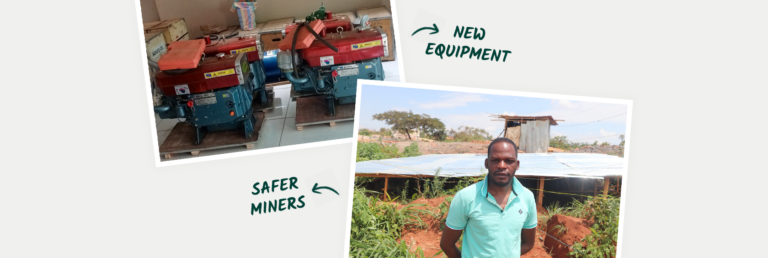Fair Materials 101: How can mining be used for good?
As we discussed in the previous blog of this series, cutting mining out of the electronics industry is not realistic. For the foreseeable future, mining is here to stay and as such, we have a responsibility to push for and demand responsible mining improvements. Could we actually use mining for good? Is that possible? Yes. We’ll explain…
Types of mining
When we think of mining, many of us visualize huge, destructive scars across the landscape with hundreds of workers and massive machinery. This image paints a picture that mining is dangerous, environmentally unfriendly and involves the exploitation of human beings. In order to understand how mining works, let’s talk about two types: artisanal and small-scale mining (ASM) and large-scale mining (LSM).

What is LSM?
Large scale mining (LSM), or industrial mine sites, contribute to the vast majority of the world’s mineral production using fully mechanised operations. These operations use extraction and processing technologies that require high levels of investment and skills. However, this type of practice has its own risks. For example, LSM operations usually require lots of land, could drive deforestation, and pollute the local environment. Unfortunately, due to the pollution and/or use of finite resources such as land and water, conflicts with surrounding communities are regrettably common.
What is ASM?
Artisanal and small-scale mining (ASM), is in many ways the opposite of LSM. When we think of the word “artisanal” many of us think about traditional handicrafts, individually made with care and attention, such as delicious cheeses. It might be easy, then, to breeze over the “artisanal” in the term artisanal and small-scale mining. Not so fast.
ASM usually uses elementary forms of exploration, material extraction, processing and transportation – generally, an unskilled labor force using very basic tools and techniques (1). On the ground, this usually translates to no formal structures and is often associated with dangerous working conditions, dismal incomes, and instances of child labor. Suddenly, our idea that “artisanal = good” isn’t so clear-cut, at least when it comes to mining.
The industry is well aware of these dangers and does not want to be linked to harmful practices. As a result, many companies disassociate themselves from ASM-sourced materials, potentially banning them from entering international supply chains. Shockingly, this can have the opposite effect – pushing the mining sector even further away from reform and reducing oversight, allowing materials to find their way into global supply chains via back channels.

Opportunity for fairness
But the risks are only one side of the story, the other side includes opportunity for good . The ASM mining sector provides a livelihood for hundreds of millions of local dependent miners and their families. Even in its current and often informal state, it is a major source of income for millions of people. Although with significantly less direct employment, LSM can also create significant economic impact: the employment of a single mining company employee may correspond with the creation of three to five employment opportunities created elsewhere, thanks to supply chain-related work and the flow of money into local economies (2).
This poses a compelling, yet exciting challenge for us. At Fairphone, we know that a transition to a fairer future needs a more sustainable approach economically, socially and environmentally, than the current status quo. We are aware of the problems associated with both ASM and LSM, and our focus is on the opportunities for development.

Depending on the way it is approached, supporting formalization and professionalization of ASM practices can help amplify its positive potential. Since the very early days of Fairphone, we have and will continue to work closely with local ASMs – continuously improving their business practices by setting up traceable supplies and establishing safe and better working conditions. For LSM that means, we will increasingly ask for them to engage with communities and contribute to the diversification and the development of local economies.
By using our buying power, we can help turn ASM and LSM into drivers of positive local development. While this will take significant investment (time, energy and money), it is possible, but it is critical that everyone in the industry demand for responsible mining that will drive impact.
(1) OECD (2016), OECD Due Diligence Guidance for Responsible Supply Chains of Minerals from Conflict-Affected and High-Risk Areas: Third Edition, OECD Publishing, Paris. http://dx.doi.org/10.1787/9789264252479-en
(2) International Council on Mining and Metals (ICMM) (2013) The role of mining in national economies. 2nd edition. Available at: https://www.icmm.com/website/publications/pdfs/social-and-economic-development/romine_2nd-edition
Graphic sources:
Intergovernmental Forum on Mining, Minerals, Metals and Sustainable Development (IGF). (2017). Global Trends in Artisanal and Small-Scale Mining (ASM): A review of key numbers and issues. Winnipeg: IISD. Available at: https://www.igfmining.org/resource/
Delve Database, Available at: https://delvedatabase.org/



